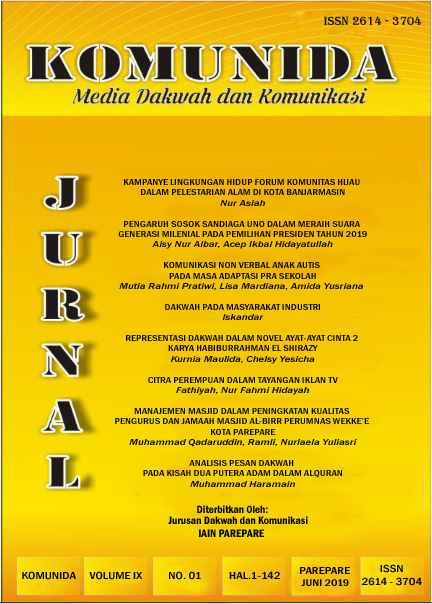Main Article Content
Abstract
Religious phenomena that are normative ideals are rational social phenomena. Da'wah needs to be understood as a system to realize Islamic teachings. Modernization and industrialization are indeed needed, because of the need to increase living standards, especially in the aspect of material needs such as clothing, food, materials and tools. But at the same time, efforts are made to seriously eliminate or overcome the unwanted effects and influences of the nature of modern industrialized life, both in psychological, religious and environmental aspects such as industrial waste, noise, the use of hazardous materials that are not controlled The aim of this research is to analyze the opportunities of da'wah in the era of industrialization and the challenges of da'wah in the era of industrialization. This article uses a descriptive qualitative research method. The findings from this study of Da'wah Islam that have strong access to the three strategic sectors will have considerable opportunities in the life of the industrialized society. Of course there are several notes, including the orientation of da'wah, industrialization has formed an industrial society, which lives in a certain cultural network, which is called the techno-culture-econ-culture-infoculture network, thus forming rational, professional and technical attitudes and behavior, Industrial society conforms to a strictly scheduled work pattern. The challenges in industrial society demand the presence of Islam which is able to answer the problems of all times. This effort is not to adapt Islam to the will of the times but to respond to changing times. Here, the Ummah needs the guidance of Muslim geniuses to respond to cultural invasions as a result of industrialization which is considered a prerequisite for progress in civilization.
Keywords
Article Details
References
- Arifin, Anwar. (2011). Dakwah Kontemporer Sebuah studi Komunikasi. Yogyakarta: Graha Ilmu.
- Basit, Abdul. (2006). Wacana dakwah Kontemporer. Yogyakarta: Pustaka pelajar.
- Amrullah Ahmad. (1993). Dakwah islam dan Perubahan sosial. Yogyakarta: Prima Duta.
- Munir Mulkhan, Abdul. (1996). Idiologisasi Gerakan Dakwah Episod kehidupan M. Natsir dan Azhar basyir, Yogyakarta: Sipress.
- Astrid, Susanto. (1979). Pengantar sosiologi dan perubahan masyarakat. Bina Cipta: Bandung.
- Amsyari, Fuad, “Strategi dan Taktik dalam Perjuangan Islam”, dalam Endang Saifuddin Anshari dan Amin Rais (ed.), Pak Natsir 80 Tahun, Jakarta: Media Da’wah, 1988.
- Tholhah Hasan, Mohammad. (2005) Prospek islam dalam menghadapi tantangan zaman. Jakarta: Lantabora Press.
- http://books.google.co.id/books/about/Metodologi_dakwah_pada_masyarakat_indust.
- www. Google .co.id / books /about / metodologi dakwah pada masyarakat transmigrasi.htm.
- Kementerian Agama RI, Terjemahan Alqur,an, edisi III, tahun 2003
- http://muhakbarilyas.blogspot.com/2012/05/tantangan-dakwah-dalam-masyarakat.html
References
Arifin, Anwar. (2011). Dakwah Kontemporer Sebuah studi Komunikasi. Yogyakarta: Graha Ilmu.
Basit, Abdul. (2006). Wacana dakwah Kontemporer. Yogyakarta: Pustaka pelajar.
Amrullah Ahmad. (1993). Dakwah islam dan Perubahan sosial. Yogyakarta: Prima Duta.
Munir Mulkhan, Abdul. (1996). Idiologisasi Gerakan Dakwah Episod kehidupan M. Natsir dan Azhar basyir, Yogyakarta: Sipress.
Astrid, Susanto. (1979). Pengantar sosiologi dan perubahan masyarakat. Bina Cipta: Bandung.
Amsyari, Fuad, “Strategi dan Taktik dalam Perjuangan Islam”, dalam Endang Saifuddin Anshari dan Amin Rais (ed.), Pak Natsir 80 Tahun, Jakarta: Media Da’wah, 1988.
Tholhah Hasan, Mohammad. (2005) Prospek islam dalam menghadapi tantangan zaman. Jakarta: Lantabora Press.
http://books.google.co.id/books/about/Metodologi_dakwah_pada_masyarakat_indust.
www. Google .co.id / books /about / metodologi dakwah pada masyarakat transmigrasi.htm.
Kementerian Agama RI, Terjemahan Alqur,an, edisi III, tahun 2003
http://muhakbarilyas.blogspot.com/2012/05/tantangan-dakwah-dalam-masyarakat.html

